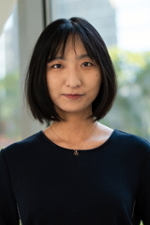Alumni Spotlight on Feng Fei
Feng Fei is a graduate of the MS-RSM program, class of 2023. She completed the non-thesis track and conducted research with Dr. Pamela Monahan. She is currently a doctoral graduate student in Information Studies at McGill University.

Mentor: Pamela Monahan, PhD
Project title: Investigating the influence of estrogen on notch signaling in reproductive tissues
What is your connection to the CRS community (mentor and position) and what is your current position?
I am a MS-RSM’23 alumni and I was mentored by Pamela Monahan, PhD.
My current position is PhD student in Information Studies at McGill University.
Could you describe your current research/studies?
My current research focuses on developing multimodal generative AI models that can generate urban soundscapes from Street View images and complementary inputs such as GIS data.
What aspect(s) of CRS did you find most valuable?
One of the most valuable aspects of CRS is its small but diverse research community. Faculty and students come from a wide range of backgrounds but share a common passion for reproductive science. It’s easy to find people who share similar interests, and the collaborative environment makes it easy to learn from one another. Through CRS seminars, I was exposed to a wide spectrum of research—from basic studies on meiosis to clinically oriented projects. It was fascinating to discover the different methodologies and approaches used across the field—many of which I hadn’t encountered before.
Another aspect I really appreciated is CRS’s commitment to both scientific rigor and social responsibility. The program doesn’t just focus on the science—it also encourages critical thinking about the broader implications of reproductive technologies. Seminar and lectures on bioethics helped deepen my understanding and challenged me to think more carefully about the ethical dimensions of the field. That balance of scientific depth and social awareness gave me a more complete view of today’s reproductive science.
What has been the most valuable aspect to your training as a reproductive scientist in CRS?
One of the most valuable aspects has been experiencing what a truly collaborative and thriving research community looks like and realizing how much I enjoyed it. This also partially leads to my decision to pursue a PhD and continue a career in research after spending a year in industry.
I also developed stronger critical thinking skills—learning how to ask meaningful questions and think deeply about scientific challenges. CRS helped me grow as a communicator as well, through opportunities to write research proposals and deliver oral presentations. Even though I’ve transitioned into a different research field, the ability to think critically, conduct research, and communicate science can translate to all disciplines.
What would you recommend to junior scientists in order for them succeed in their scientific careers?
As a junior researcher myself, I’m learning that dealing with failure and negative results is just part of the process. It’s not always easy, but I try not to take them personally and instead see them as useful data points. One thing that’s really helped me is focusing on experimental design and troubleshooting—asking questions like: What worked? What didn’t? What partially worked? How can I confirm it?
I’ve also realized that rushing through experiments usually doesn’t help. Taking the time to do things carefully really matters in science. Identify the most critical steps in a protocol and give them extra attention, rather than treat every step the same. And finally, for longer experiments, taking breaks when needed makes a big difference—it keeps you focused and helps prevent mistakes.
What do you think will be the next big contribution in the reproductive biology field?
I believe two major advancements have already started to show great potential and will make even greater contributions in the near future. 1. The integration of artificial intelligence and computer vision into time-lapse image analysis will significantly enhance in vitro culture monitoring in both research and clinical IVF settings. 2. The development of integrative multi-omics and spatial omics technologies will open new avenues for understanding the molecular and spatial complexity of reproductive diseases, paving the way for more precise diagnostics and targeted therapies.